We continue the New Mexico installment of the “Advocating on the Road” blog series.
Unfortunately hunger is not confined to the borders of New Mexico. Across the United States, nearly 14.5 percent of households were labeled “food insecure” by the United States Department of Agriculture (table 1A) — meaning these Americans were, at times, uncertain of having or unable to acquire enough food for the household due to insufficient resources. Sadly, New Mexico’s struggle with child hunger is a microcosm for an endemic nationwide problem: more than one in five American children is at risk of hunger — and this number is even higher among African Americans and Latinos (nearly one in three children are at risk) (Table 1B, Table 3).
Families in New Mexico and throughout the nation find necessary aide in programs like the Supplemental Nutrition Assistance Program (SNAP), the Special Supplemental Nutrition Program for Women, Infants and Children (WIC), the Emergency Food Assistance Program (TEFAP), and the Commodity Supplemental Food Program(CSFP). These programs are a lifeline to millions of struggling and impoverished Americans. Administration officials estimate the Supplemental Nutrition Assistance Program (SNAP) alone currently serves nearly one in seven Americans.
The recession of the past few years has changed the face of hunger in the United States. American families who were once economically stable have been thrust into deeper need, and sharp increases in SNAP participation reflect this uptick. (Nearly 18 million more Americans are enrolled in SNAP today than prior to the recession, 180,000 of whom are from New Mexico). Today SNAP serves millions of American adults and children, operating with an extremely low rate of payment error.
It is troubling to see assistance, like SNAP, at risk in the current debate over the direction of the federal budget. These vital programs have become prime targets for budget cuts, restructurings, and flat-funding. We must ask ourselves, what would happen if these programs were harmed? What would happen to families in New Mexico’s communities — and communities across the United States — should these social-safety net programs become further weakened?
As Lutherans, we believe that government has a strategic and instrumental role in advancing the common good. It is with this understanding that the ELCA, along with other church bodies and faith-based organizations, works to support a Circle of Protection to express that care for people living with poverty and struggling with hunger must be a national priority. ELCA bishops, pastors, seminarians, and congregants are challenging Congress and the Obama Administration to “resist budget cuts that undermine the lives, dignity and well-being of poor and vulnerable people.”
The ELCA Washington Office, in collaboration with other faith groups, works to express these concerns to national leaders through direct advocacy, generating letters and activating ELCA Lutherans across the country to highlight and lift up the need for these programs in the lives of those struggling to meet the needs of their families.
We all must continue to press the importance of protecting hunger programs from harmful cuts, now more than ever.

